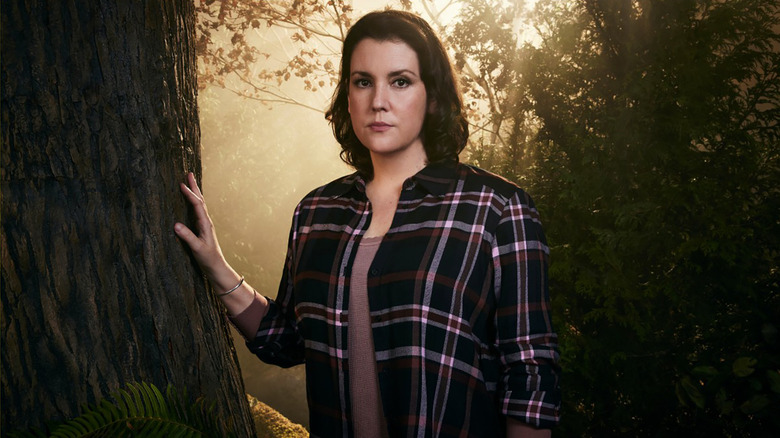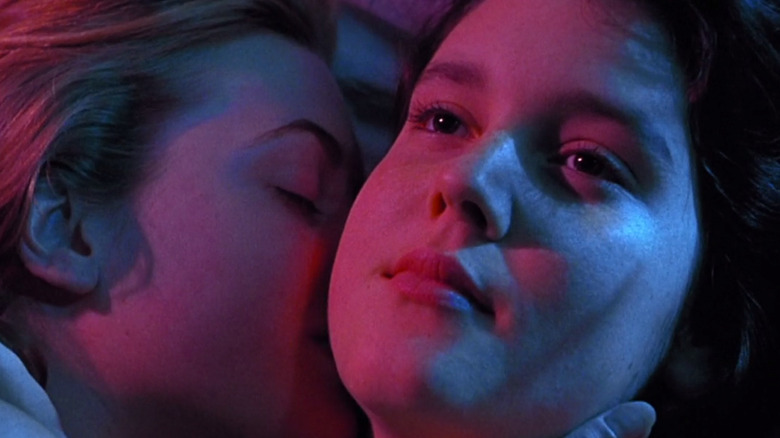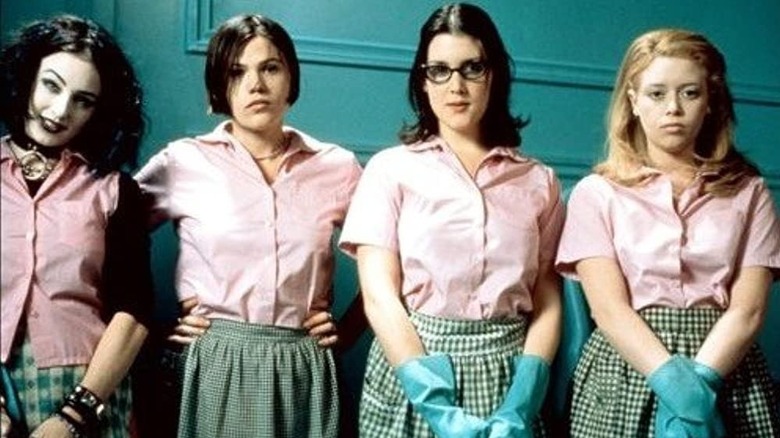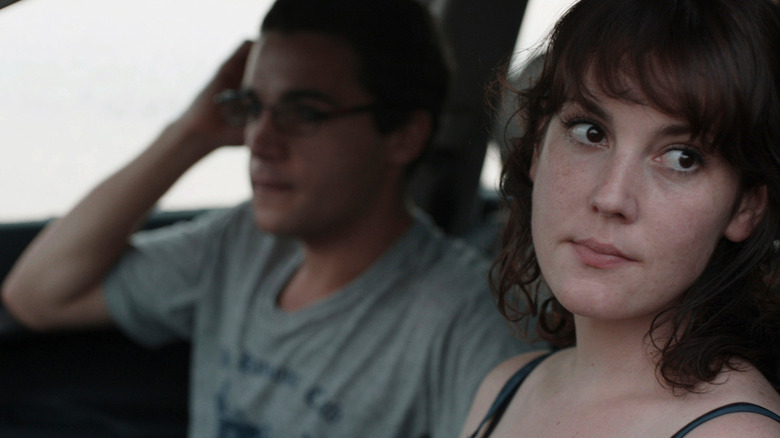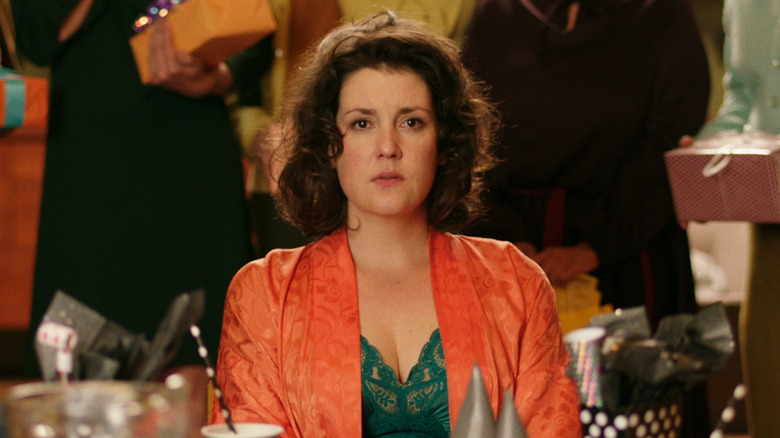An Untitled Article About How Much Melanie Lynskey F****** Rules
My parents had a standing agreement with the Mom & Pop video store at the end of my block growing up that I was allowed to rent whatever I wanted, no questions asked. It's how I was able to name John Waters as my favorite director before I was old enough to get my braces off, and it's why I was renting rape-revenge movies before I had my driver's license. With the ability to rent with reckless abandon, I got my hands on movies I was probably too young to correctly process, but movies that helped shape my existence during some of the most pivotal years of my life. As a chubby-cheeked pre-teen struggling to understand my growing feelings towards other girls, few movies made me feel as understood and seen as Peter Jackson's "Heavenly Creatures."
As I grew older and more immersed in the world of film criticism, "Heavenly Creatures" would frequently sneak in on lists of "Best Female Villains" or "Actors You Didn't Realize Starred in Horror Movies." Almost all of the discussions around the film I had seen focused heavily on the debuts of Peter Jackson and star Kate Winslet, perhaps understandably, as both have gone on to become Academy Award-winning creatives. They're both phenomenal, there's do denying that, but my love for "Heavenly Creatures" sparked a life-long appreciation for the film's other star, one of the most underrated and underutilized actors in the industry, the incomparable Melanie Lynskey.
A Brief Introduction to Melanie Lynskey
"Heavenly Creatures" was Lynskey's professional acting debut, nabbing the role as Pauline Parker (of the Parker–Hulme murder case) after a casting director visited her high school. Over 500 young actresses had been seen before Lynskey was chosen, with the film's co-writer Fran Walsh noting that they knew Lynskey was right for the role immediately. The film was nominated for Best Original Screenplay at the 67th Academy Awards and Lynskey was named Best Actress at the 1995 New Zealand Film Awards. There's a quiet power in her performance, one that haunted me for years as I tried to process why I felt so seen by her character.
A few years later, Lynskey would pop up in the Drew Barrymore-starring "Ever After: A Cinderella Story." Lynskey played Jacqueline de Ghent, the less-favored of the wicked stepmother Rodmilla de Ghent (Anjelica Huston). She spends most of the movie being treated poorly by her family, but in a moment of boldness, weaponizes an insult her mother previously laid upon her by saying "I'm only here for the food" in the presence of the King and Queen. It was the first time I had ever seen a character fight back against fatphobic statements made by family members from a character scorned for daring to exist in a body and face that wasn't the standard. Don't get it twisted — Lynskey is and has always been stunning, but Hollywood is only interested in a particular type of woman. As author Lucy Grealy describes it, "Beauty, as defined by society at large, seemed to be only about who was best at looking like everyone else." Melanie Lynskey didn't look like the rest of the women in Hollywood, but she looked like me, and she immediately became my queen.
Lesbianism and Rock & Roll
1999 was the year for teen cinema, and Lynskey appeared again in two roles that completely changed my life. As an unironic lover of the band KISS, "Detroit Rock City" was the rock & roll adventure I'd always dreamed of. Lynskey's Beth Bumstein was the girl I desperately wished I could be more like, and the fact she has sex in a Catholic confessional booth was the biggest power move I could process as a pre-teen. I never quite saw myself in films at that age, but every time I saw Melanie Lynskey on screen, I felt a little more normal in a world that constantly made me feel like an alien.
Everything changed for me when I saw "But I'm A Cheerleader." I know, I know, Clea DuVall is everyone's big crush, but I was always possessed by Lynskey's Hilary. The way she was still a lesbian while proudly donning lipstick and cat-eye glasses planted the seed for my own eventual queer reckoning. I spent a decade of my life fighting my truth because I didn't "look" like a lesbian, but seeing someone who looked like Melanie Lynskey, who looked like me, say out loud "It's really easy to be a prude when you're not attracted to him, isn't it?" I know that I'm not alone when I say that the "Heavenly Creatures" to "But I'm A Cheerleader" lesbian awakening pipeline is very real, and Melanie Lynskey's existence in both of them was the life affirming representation so many of us needed.
More Than Just A Side Character
As the years went by, Lynskey was pigeon-holed in "best friend" side parts in studio pictures, only really given the chance to shine in independent features, and I never understood why. She spoke candidly with Rolling Stone about the way she's been treated over the years, a sobering reminder that far more people in positions of power continue to view her through the same lens as Rodmilla de Ghent, and not as the remarkably gifted actor she is and has always been. Even during the production of "Yellowjackets," she reported a production member asking her what she was "going to do" about her body, noting that they'd probably hire her a personal trainer. The internet has rightfully taken up arms in her defense, because how dare anyone disparage the magnificent Melanie Lynskey?
I'm not going to sit here and rattle off her IMDb credits, because the talent and impact of Melanie Lynskey is so much bigger than the fact she played Rose on "Two and a Half Men." Many consider her role in "Hello I Must Be Going" to be the turning point in her career, even nabbing a nomination at the Gotham Awards for Breakthrough Performer, which seems like a backhanded compliment to someone who had already been consistently working for nearly two decades prior. This wasn't a "breakthrough," it was a showcase of the exceptional work she had been delivering for years. Melanie Lynskey has always been a superstar, and it's frankly criminal that it's taken so many people this long to finally get on board.
I Love You, Melanie Lynskey
In recent years, I've marked out pretty hard whenever Lynskey shows up. "Happy Christmas," "Digging for Fire," "Little Boxes," "XX," "Castle Rock," "Togetherness," "Mrs. America," "Over the Garden Wall," and "I Don't Feel At Home in This World Anymore" are all made infinitely better because of Lynskey. Every decision she makes is perfect, every instinct she has for a character is the correct one, and I have never watched a Melanie Lynskey performance and thought that it could be better because it was always impeccable from the start. As a diehard fan of "Yellowjackets," I am ecstatic to see how many people have been spending every week online singing the praises of Melanie Lynskey, because she deserves it, and the mass outpouring of love is long overdue.
Her run as adult Shauna is undoubtedly some of the best work in her career, but it is admittedly frustrating to hear people talk about her performance as if it is the first time she has ever been this good. Lynskey has always been incredible, she has always been captivating, and she has always been right in front of our faces. So much of my personal ability to see myself the way I do is inspired by the ways I've seen Lynskey on screen. Because of her, I know I am able to be strong, proud, sweet, bold, angry, loving, responsible, chaotic, maternal, and insanely sexy all at once. She contains multitudes, as do I, and there's power in embracing all aspects of my character.
The fact Lynskey isn't one of the most highly sought-after performers in the business is due to no fault of her own, but the ridiculous Hollywood machine that has taken decades to finally see what so many of us have known all along: Melanie Lynskey f****** rules.
